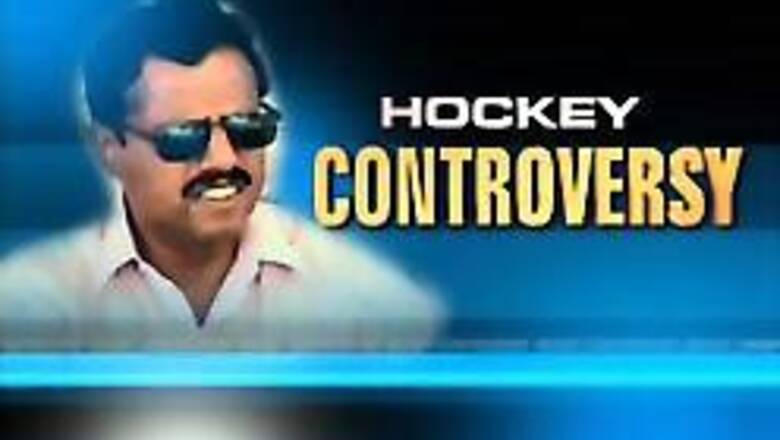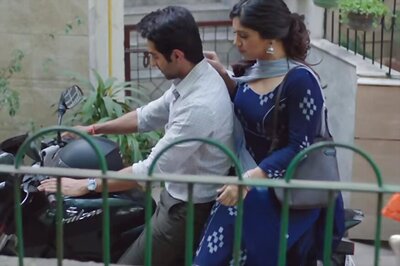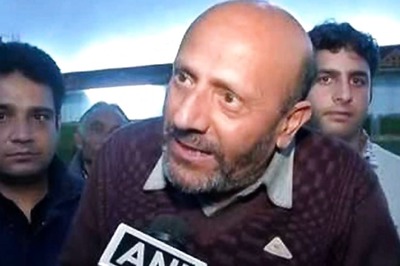
views
From Chak De! hockey to corrupt hockey, the cycle is complete. Indian Hockey Federation's general-secretary K Jothikumaran was caught taking money for offering a place in the Indian hockey team.
If match-fixing in cricket was the darkest hour of Indian sport, then the latest incident is arguably the biggest shame for the country’s sporting fraternity, leading a nation of skeptics to believe that an Indian cap is just a price tag away.
CNN-IBN debated the issue on Face the Nation with a panel comprising former Indian hockey coach Mir Ranjan Negi; former world billiards champion Michael Ferrera and Padmabhushan laureate and Managing Director of the Mohun Bagan football club, Anjan Mitra.
The National Games may be facing fixing allegations, perhaps for the first time, but the culture of corruption creeping into Indian sports is certainly not a new phenomenon.
From 2000, which was described as the most shameful year for Indian sports, cricket came under cloud with former Indian captain Mohd Azharuddin and ex-Test player Ajay Sharma being banned for life over allegations of match-fixing.
Ajay Jadeja and Manoj Prabhakar were also handed five-year suspensions after they were found guilty of being involved.
Corruption also crept into the tennis fraternity. In January 2008, tennis ace Mahesh Bhupathi revealed he rejected an offer to throw a match during the 1996 Davis Cup.
Where does this place the notion of pride being associated with sport? Michael Ferrera put it in perspective. "Playing for India is the greatest thing that one can ever aspire for. But it is absolutely shocking and scandalous to imagine this great honour can be bought for a mess of pottage. It makes me sick to my stomach, and if these allegations are true, he should - in the words of Dhanraj Pillay - be crucified."
For more than 10 years, there has been a notion that Indian hockey has been going down the drain. Whether corruption is the real cause of mediocrity, remains trivial. "Right from the time I started playing hockey, there have been numerous instances where at the last moment, a player was dropped, and someone else went with the team," former national hockey coach Mir Ranjan Negi reveals.
"Never in our wildest dreams could we dream of something like this to have happened. In my first camp for the 1978 Bangkok Asian Games, the team was announced and one player, Saleem Abbas, was selected in the team. At the last moment, there was another player, Ramesh Parmeshwaran, who replaced him coming out of nowhere," he adds.
While some opine the responsibility lay with sports administrators, others blame the hierarchy for the rot. Anjan Mitra, Mohun Bagan's Managing Director, referring to Jothikumaran, said, "As an administrator, I feel embarrassed to comment on one of our colleagues that he has taken money for the induction of a player in the Indian team. It's a shocking news for the entire sports administration, and we feel that it has to be taken up seriously, and at the same time, under whose instruction and who shared this money, needs to be identified."
The rot is not just restricted to hockey. Convictions have been made and people have been identified as guilty in various sports like football, tennis and cricket. With sport becoming a business and a marketable commodity, and therefore, everything that aids business has also started affecting the sports fraternity.
Ferrera agrees. "I believe that's true. Sports has indeed become a business. But the national character, which is prone to corruption, has crept into this sacred portals of sport. It is disgusting to me as a sportsman, as a man of honour, to see that these things happening in sport. Sportsmen per se are honourable, decent people. But when money enters the equation, when there are corrupt administrators, there comes a time when every person has his price. And unfortunately, some sportsmen succumb to this," he explains.
"Everything has become commercialised, and that has happened to sports also," Negi adds. "People want to go for higher studies, rather than taking up an odd job. When the question of money in sports in concerned, people will flock to sports as well. There never was money ?in hockey. But there was always a feeling of a need to do something."
PAGE_BREAK
But despite the ever-growing clamour for the removal of IHF boss KPS Gill, nothing has come out of it. In fact, he should be the one answerable to the mess that hockey is in, not just Jothikumaran.
"Mr Gill cannot be exonerated in anyway in the first place, because he is the head of the institution, in which he is a fatherly figure, and he knows exactly what is happening. Players like Len Aiyappa and Gagan Ajit Singh, who have represented the country in the recent past don't even want to attend the national camps because they were not given proper treatment. Mr Gill and his team never cared to see what was going wrong," Negi points out.
It appears that the rot that is coming to the fore in hockey is something that has been there for a very long time. And, as pointed out earlier, it is not just restricted to hockey, it also extends to several other sports.
Mohammad Ali once said that champions can't be made in gyms. You need a certain amount of pride, vision and desire. Sport seems to have changed as a profession with the revelation of instances like these.
"I think the basic equation remains the same. Champions are made in the mind and they are made out of fierce desire and a sense of pride. That remains unchanged. But with large sums of money coming in to any sport, the human element comes forward. There is bound to be a tinge of corruption somewhere down the line, unless your upbringing is of the best," Michael Ferrera says.
"Can you imagine a person coming from a remote part of India being offered a place in the hockey team in exchange of money, with the assurance that he will secure a decent job. This kind of allurement has a lot of weight, and it takes a very strong mind to resist it. That's the basic question," he adds.
Sport was once the ultimate fraternity between the body and the soul, a doctrine where nothing else but only merit and ability to perform on the field mattered. But money, it is perceived, is the only matter that has destroyed this doctrine.
Mir Ranjan Negi agrees with Ferrera. "When we started playing, it was only for the love of the game. When we started playing, cricket and hockey were almost on the same level, in terms of money, in terms of popularity. The Federation is largely responsible for seeing hockey in such a low while cricket has achieved cult status."
But is also largely due to the fact that sports other than cricket are just not getting their due recognition. "Even if something is happening in hockey, people seem to be least bothered about what is going on. We won the Asian Games in 1998 after 32 long years, but half the members of the team were dropped thereafter. There was a lot of hue and cry, but for a common man, it didn't matter at all," laments Negi.
Kolkata, for a city, takes immense pride in its sporting culture, with soccer being a very popular sport. "We had some glorious days in hockey in the 1950s and 60s. But with the introduction of astoturf, hockey has become a dead game in West Bengal. There is not even a single astroturf in the state," Anjan Mitra notes.
But with the revelations at hand, the psyche of sport and sportspersons has been dented forever.
"Any person of any character takes immense pride in himself and and in representing his country over and above anything else. That remains as true as it ever was," Ferrera signs off.
Final results of the SMS/Web poll:
Corruption in Indian hockey: Can an Indian cap be bought for a price?
Yes: 78 per cent
No: 22 per cent.



















Comments
0 comment